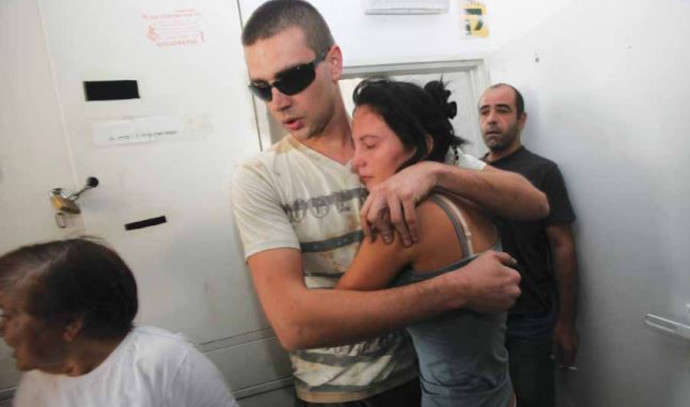I have lived here for 24 years. We thought we were at war after 9/11, during the Second Intifada, over our three very long years of fighting COVID-19, and most recently in the lack of unity and horrible infighting. But now, there are simply no words.
It is simply unimaginable for us.
I did the psychological debriefings in Israel for the American Embassy staff after 9/11. I actually didn’t watch the video footage of that day for several years because I knew in order to be helpful, I needed to be present in the moment and not be impacted by all that came before it. Now as some of my family members are fighting in the South, as others are setting up underground emergency hospitals, and I myself am involved in debriefing first responders, I have tried not to look at or watch the news images for the same reason. We are all, however, so deeply involved in the fabric of our precious nation, that we cannot separate ourselves from what is going on around us.
We will get through this one way or another and will be stronger as a result, but it is difficult if not impossible to imagine that just now.
Our lives will be forever changed. I was asked to write this by Erica Schachne, my editor, and in all honesty we both struggled as to where to begin and what to focus on.
When things are changing on a minute-by-minute basis, it almost seems futile to say anything that will still be meaningful in a few days. We feel such angst as our death toll, the numbers of wounded, and the numbers of missing or kidnapped continue to climb by the hour. We are in shock, in grief, in a state of disbelief, and feel so shaken and vulnerable. We are overwhelmed. Dear readers, we are deep in the trenches, and now we must all work together, to take care of each other, as best as we can as a country as we cope with the current situation.
I am holding you all in my heart. Whether it is our soldiers, your children, your spouses, your siblings, the first responders, the hospital workers, those in the South and the North, alone and those with family, we are all fighting the tragic events that none of us could ever have imagined. We are all on edge. We are all anxious. It is normal. We will all get through this in one way or another and need to be there in this moment for each other more than ever before.
We will need to go back and review how this could have happened, but that time is not now. Now is the time to fight our enemy for our very survival and help each other as best as we can and in whatever way we can.
First, and foremost, I wish a speedy recovery to those of you who have been wounded, and I share in the grief of those who have lost those dear to you. Please know that our thoughts and prayers are very much with you.
I wish that at this moment I could say more that could help to take away the pain that you are feeling now.
Let’s breathe
Before we go further, we all seriously need to take a slow breath in, and then a long slow breath out, and remember – at this very moment, if you are reading this, you are really okay – even if you don’t feel that you are at all. Remember, as Israelis we have learned over the years to live our life in between events, and this is what we must do now.
I’m going to give some suggestions for minute-by-minute coping for you and your family; but first, I want to review some of the symptoms of acute stress that you might currently be feeling. These are all very normal reactions to a very abnormal event. And let’s face it, our current situation qualifies.
It is important to know that when we are dealing with an event that is sudden, unexpected, violent, complex, or involves children, coping becomes all the more difficult for us. Being more vulnerable leaves us feeling even more traumatized by what is going on around us.
Reminders about stress
You can only be in control of what you can be in control of, but there is much that you can be in control of.
- Look around you now, and list some of those things out loud.
- You can point out some of these with your partner, friends, or kids, and help empower them by asking for their input.
Your perception of the stress will determine how you react and cope and therefore how others around you, such as your partner, friends, parents, and children, will handle things. How your children will cope will also depend very much on their age, emotional development, previous and current personal experiences, and the safety of your family. They will feel your stress, as well as the stress around them. While we can’t control all of the events, we can certainly control how we try to deal with them.
- Check out whether you focus on the stories of disaster or the amazing heroics of people and the massive humanitarian efforts of the country. While it may feel difficult to find balance at the moment, appreciating each one of these miracles and acts of kindness will help strengthen you.
- Remind yourself and others that at this very moment, you are okay.
- Sometimes just doing a scan of your body can help to calm you in the here and now.
This is a quick and easy exercise. Start with a slow breath in and a very, very slow breath out, as if you have a candle flame that you don’t want to blow out. Purse your lips. Do the breath in and out again. Try to feel your body attempting to calm itself. Then start…
Notice your head, your neck, how you can lower your shoulders and how they feel – and your upper back as it comes in contact with a chair or the bed, and continue to work your way down your body until you get to your feet.
Now notice your feet on the floor.
Then take another slow breath in and out and do the body scan once again.
- There are lots of good relaxation exercises for both you and your children. If you practice them, they actually work. Whether it is yoga, visual imagery, or massage, these are very effective in reducing your stress. Put on a video and dance or exercise, alone or with your children. This can be a great stress buster.
Take note, for example, of how easy it otherwise is when you are stressed, to hold your breath or even forget to breathe. Often you may not even be aware of it.
- Try to rest when you can. Everything is easier to handle when you are not sleep-deprived. Of course, this may be easier said than done, but if you don’t try, it certainly won’t happen.
- Don’t forget about your spiritual needs. Prayer and meditation may have a whole new meaning now and can reduce your stress, give you faith, and keep you connected.
- There are many other ways to look after your health. Eat healthily, drink lots of water, look after your sleep, and avoid drugs or self-medicating, alcohol use, and tobacco.
- Make sure, especially now, to see your doctor if you are having physical complaints. It is easy to blame things on stress, but sometimes there are other issues that need to be addressed.
- It is important to take much-needed breaks from your stress in order to refuel. Sometimes, the best way to cope is by distraction. Read a good book, watch a movie, listen to music, or do a craft project. Remember, as they say on the airlines, it is important to put on your oxygen mask first before you can help others.
- Try to stay busy; if you can work, do so. Volunteer, help out with others. Collect and pack donations for the soldiers or those displaced. Offer rides to people, babysit, or pet sit for those who need it.
- Make sure you talk with people who make you feel good – in person, by phone, or by email. Sharing helps strengthen your personal support system and helps give you meaning at this difficult time.
- It is important to not sit all day listening to and reading the news. It revs up your nervous system in an unhealthy way and diminishes any hint of calm you might possibly work to have. Mute your WhatsApp messages and take a break from social media. You can be on a need-to-know basis.
This “no news” status helps you focus and signals to you that “all is okay.” In this moment, all is okay – unless it is not.
Helping children cope
- Older children also should have no – or very limited – media exposure. They are unable to discern what is real and what is not and don’t realize that the horrendous images shown over and over again are not new events or separate incidents but are rather looping again and again.
- Children can be encouraged to draw pictures, write stories, or keep a diary to enable them to express their fears and have greater control. Children can make cards, cakes, and gift packages for soldiers or those wounded. Help encourage children to pray, practice relaxation, and feel that they are in control.
- Remember, in order to look after your children, you must take care of yourself. Your children benefit most when they see that you are trying to take control of your own life. What you say and do will impact them in every way, so if you are calm and handle things well, then so will they.
How will you know if your child is not coping?
You can expect to see that if their parent has been called up, their routine has been altered, or because they sense the anxiety and despair around them.
Children who are having difficulty with everything that is going on around them will show symptoms, dependent on their age and their level of maturity.
Children may show signs of regression such as temper tantrums, wetting, soiling, sleep issues (such as waking up more often at night, having more trouble getting to sleep, getting up early, or spending more time in bed); or they may be having food concerns (eating more or less than usual). They may have difficulty with socialization, concentrating, focusing, paying attention, or remembering important details. They may appear sad, quiet, fearful, or preoccupied.
Some children may appear depressed, withdrawn, irritable, or disinterested. They may be fearful to the point where they don’t want to leave the house, want you to remain at home, have difficulty focusing on schoolwork, or appear excessively preoccupied by war talk. Some children show physical and somatic complaints such as increased headaches, stomach aches, and miscellaneous complaints.
- Talk to and with your children. Children too need to voice their concerns and know that you are there to listen and help. Through our actions, we encourage our children to hope for a better tomorrow and convey our faith that things will ultimately improve. While there are no easy answers, enabling your child to feel good is one of the best gifts you can provide during these very troubling times.
- When dealing with children, keep it simple. Less is best.
- Answer their questions as honestly as you can. Often these discussions need to be dealt with at a time when you yourself have so few answers. Even if you don’t have any answers, and at this point we all have more questions than answers, the key is to reassure them that your job is to look after them (or whoever else is looking after them if you are unable to be there) and let them know that you are ensuring their safety.
You provide reassurance that all is right with their world.
- A simple “How are you doing?” might enable them to engage in a conversation that might otherwise be missed. They too need to talk and have their feelings validated. You might be surprised at how basic their worries may be. If your children are older, it is important to address their concerns, and provide accurate, honest, and age-appropriate information.
- If you and your children are not coping well, seek professional help. Talking with a qualified professional can lighten your burden significantly. Children need someone to whom they can confide their concerns; if it can’t be you, find someone to help.
- Help everyone feel in control. Put a routine in your day as much as you can.
After a month of holidays and very little routine, many people were looking forward to getting back on track. In spite of the lack of predictability in terms of what is going on, take control over those things that you can in your day. Try to get into predictable routines during these unpredictable times.
- Keep schedules, play dates, and other routines as normal as possible, in keeping with the official safety guidelines.
- Be flexible while providing appropriate discipline and rules. This will help everyone feel more secure when the rest of the world may feel out of control and unstable. This is especially true for teenagers.
- Give children choices and realize that while the current issues may be on your mind a good part of the day, children may visit and revisit the situation for short periods of time only.
Families of soldiers
If you are the parent, spouse, partner (or sibling, grandparent, aunt, uncle, cousin, or friend) of someone who has been called up, we know that the lack of information that you may have may make your life more difficult than ever before.
- Reach out to your friends and family. You will need support in the coming days.
- Please also know that there is a community there to support you and your family members. We are very proud of all that those on the front lines have done for each and every one of Israel’s citizens.
May we all be kept safe from any further harm, and may we see better, quiet days soon.
The writer is a licensed clinical psychologist in private practice in Ra’anana and author of Life’s Journey: Exploring Relationships – Resolving Conflicts. She has written about psychology in The Jerusalem Post since 2000 and specializes in trauma, grief, and bereavement. ludman@ netvision.net.il, drbatyaludman.com
Stress: common symptoms
These are especially prevalent in the first several days after an event.
Physical stress symptoms
- Sleep difficulties, fatigue
- Exhaustion
- Dizziness, weakness, chills
- Increased heart rate and blood pressure
- Nausea
- Chest pain
- Headaches
- Muscle tremors
- Decreased or increased appetite
Cognitive stress symptoms
- Confusion
- Intrusive thoughts and images, rumination
- Hypervigilance
- Poor memory and concentration
- Difficulty making decisions
- Blaming others
- Disrupted and disorganized thinking
- Difficulty paying attention
- Emotional stress symptoms
- Shock and disbelief
- Anger, irritability
- Numbness, helplessness
- Feeling overwhelmed
- Despair
- Fear or panic
- Guilt
- Anxiety, agitation
Behavioral
- Withdrawal from social activity
- Crying
- Increased drug or alcohol use
- Lack of interest in activities that usually bring pleasure
There are many more that I have not mentioned but that you may be feeling. With time, they should subside. But if you feel you are not coping, please reach out to your health fund, the many hotlines set up for English speakers, or to your doctor or mental health professional.
There are many people who are there for you, and you need never feel alone.



